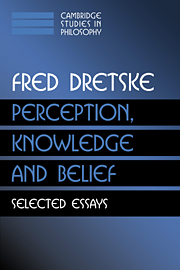Book contents
- Frontmatter
- Contents
- Preface
- Part One Knowledge
- Part Two Perception and Experience
- Part Three Thought and Intentionality
- 11 Putting Information to Work
- 12 If You Can't Make One, You Don't Know How It Works
- 13 The Nature of Thought
- 14 Norms, History, and the Constitution of the Mental
- 15 Minds, Machines, and Money: What Really Explains Behavior
- Index
15 - Minds, Machines, and Money: What Really Explains Behavior
Published online by Cambridge University Press: 19 December 2009
- Frontmatter
- Contents
- Preface
- Part One Knowledge
- Part Two Perception and Experience
- Part Three Thought and Intentionality
- 11 Putting Information to Work
- 12 If You Can't Make One, You Don't Know How It Works
- 13 The Nature of Thought
- 14 Norms, History, and the Constitution of the Mental
- 15 Minds, Machines, and Money: What Really Explains Behavior
- Index
Summary
According to a prevalent philosophical picture of the way mind and body are related, the mind is to intentional action what money is to the behavior of a vending machine. Just as coins are in (or get deposited in) vending machines, beliefs, desires, and intentions are in, or get produced in, us. And just as the right coins deposited in the machine cause it to behave in a certain way – to yield its contents: Coca-Cola, cigarettes, or candy, as the case may be – so the right mental entities occurring in us cause us to perform various actions. Furthermore, just as what makes money money is not its intrinsic character – shape, size, and density of the coins, for example – but certain extrinsic or relational facts about these coins (the fact that they possess monetary value), so too what makes a belief a belief is not its intrinsic neurobiological character but, rather, certain extrinsic facts about it – the fact that it has a certain meaning or content, the fact that it has certain intentional properties.
If we take this analogy seriously, it suggests that beliefs, qua beliefs, are as irrelevant to animal behavior as is money, qua money, to the behavior of vending machines. Since it is facts about the shape and size of coins, not facts about their monetary value, that explain why coins cause a machine to yield its contents, the analogy, if we take it seriously – and a good many philosophers do – compels us to conclude that it is the intrinsic features of beliefs, their neurobiological properties, not their extrinsic properties, their meaning or content, that explains why we do what we do.
Information
- Type
- Chapter
- Information
- Perception, Knowledge and BeliefSelected Essays, pp. 259 - 274Publisher: Cambridge University PressPrint publication year: 2000
Accessibility standard: Unknown
Why this information is here
This section outlines the accessibility features of this content - including support for screen readers, full keyboard navigation and high-contrast display options. This may not be relevant for you.Accessibility Information
- 2
- Cited by
